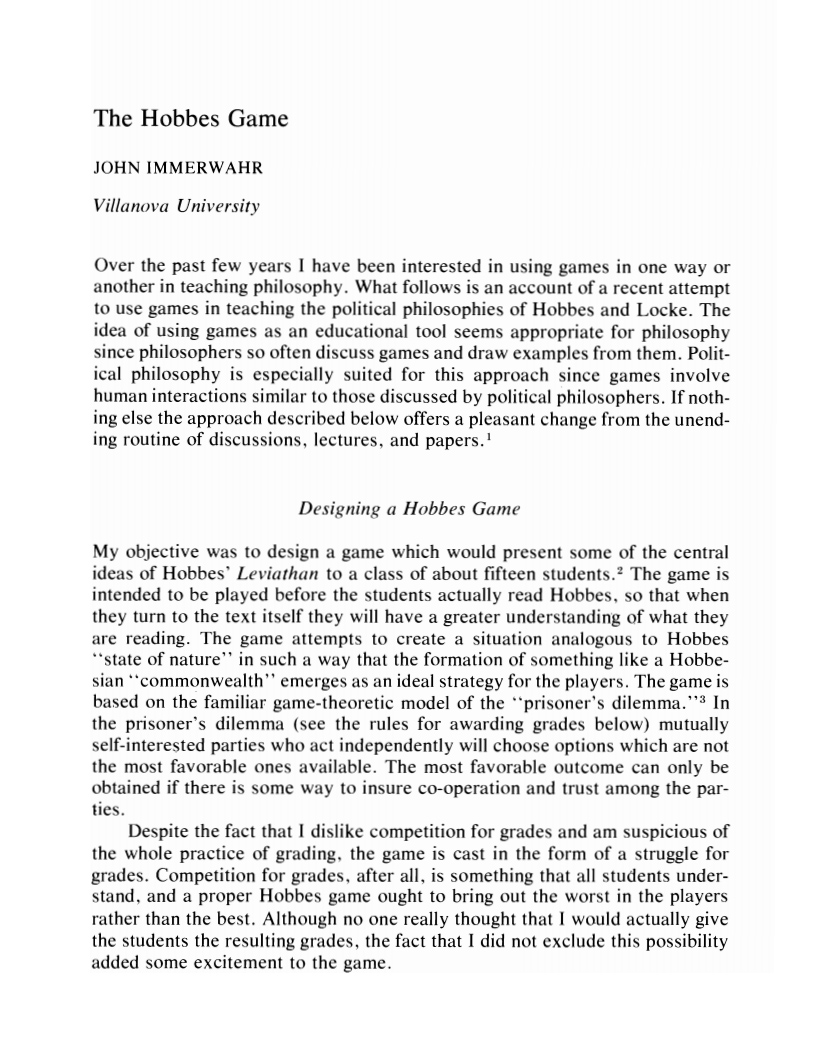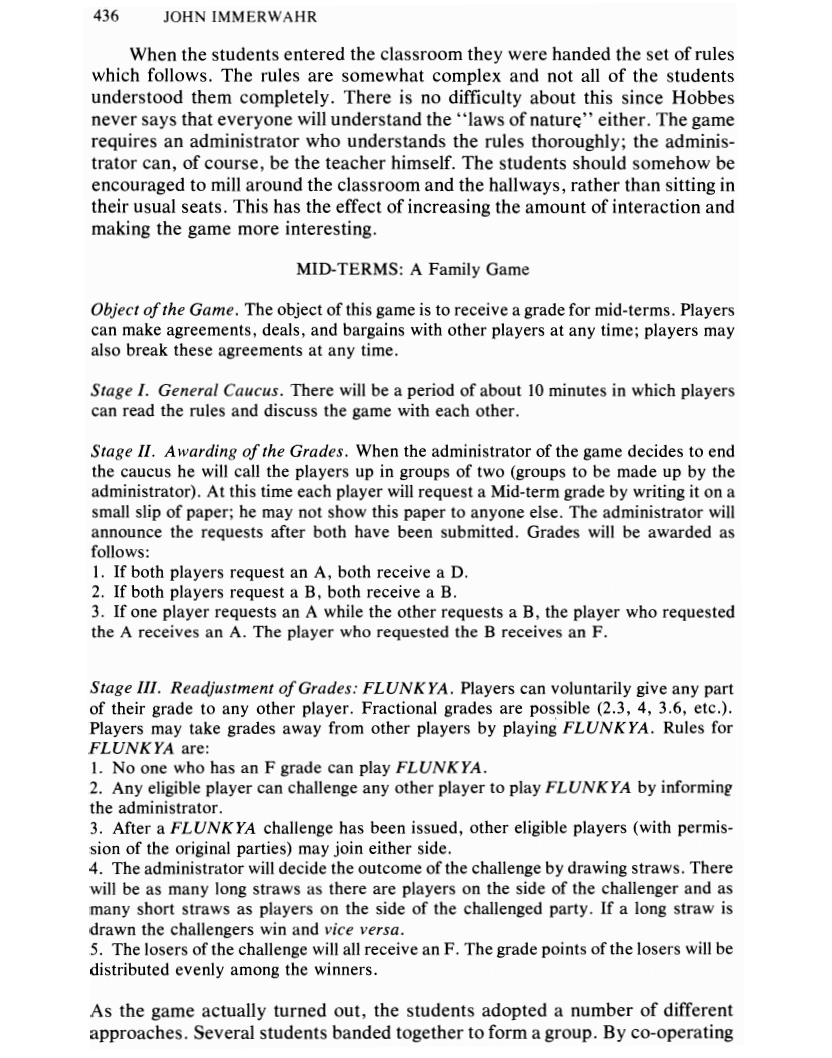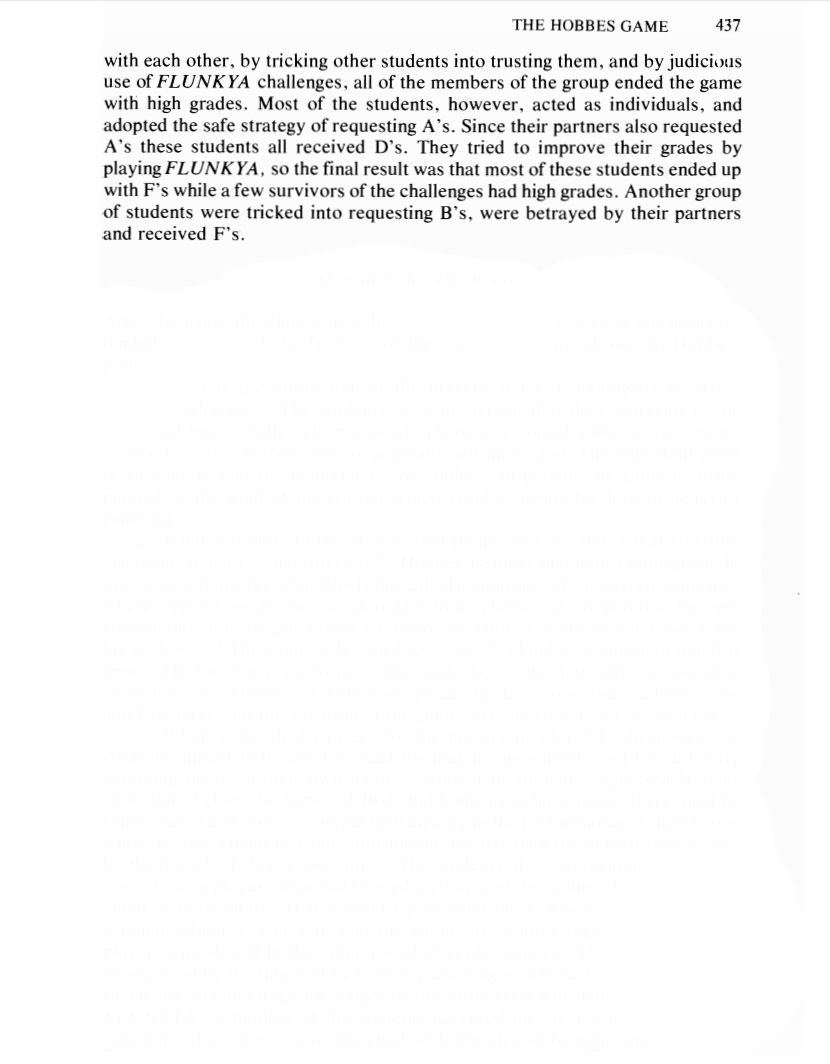Philosophy Teaching Games
Do you use games as a teaching tool in your philosophy course? And if so, which games, and to teach what? The questions were prompted by a friend drawing attention to “The Hobbes Game” by John Immerwahr (in the Fall 1976 issue of Teaching Philosophy). He lays out the game in the first few pages of the article, reproduced below. See the full article for a discussion of the game and some other ones.






I hav en’t yet had the opportunity to do this, but I’d like to bring in some armour one day for a real-life reenactment of a knights and knaves puzzle.
I’ve used truth-functional aerobics to teach propositional logic. Students get into large enough groups. All but one of the group members stand in a line and each makes the shape of a T, F, parenthesis, or one of the connectives. Once they form a well-formed formula, the last member of the group makes the truth value of the total formula.
I’ve also done proof relay races. Two teams. They are given some premises and something they have to prove. Each team lines up in front of the chalkboard. Team members take turns writing lines of the proof. Whichever team produces a correct proof first wins.
I don’t know if it’s a game, but splitting students into small groups and having them draw pictures of some argument from the reading is fun.
There’s also this Rawls game: http://crookedtimber.org/2004/03/18/game-on-rawlss-second-principle/
Proof relay sounds AMAZING and I want to do it!
When I’ve done personal identity, I started by having students play “Staying Alive: the personal identity game” on-line beforehand: http://www.philosophersnet.com/games/identity.php .
A game on Rawls’s second principle:
http://crookedtimber.org/2004/03/18/game-on-rawlss-second-principle/
An old out of print gem I came across at a comic book store: “Class Struggle” the board game.
https://boardgamegeek.com/boardgame/1510/class-struggle
Before talking about distributing climate-changed-related costs, I’ve have students do a mock negotiation, where each student represents a country with different features. The “countries” vary on all of the features that someone might propose to base a distribution principle on: ability to pay, contribution, current level of development, etc.
In fall quarter 2016 I will be teaching a political philosophy class using a game called Rousseau, Burke and Revolution in France, 1791. It is part of the Reacting to the Past series of games. As the Reacting web site puts it, “Reacting to the Past (RTTP) consists of elaborate games, set in the past, in which students are assigned roles informed by classic texts in the history of ideas. Class sessions are run entirely by students; instructors advise and guide students and grade their oral and written work.” See https://reacting.barnard.edu/ for more info.
As it happens I am organizing a two-day conference April 8-9 2017 at UC San Diego at which interested faculty and graduate students can learn RTTP by playing the Rousseau game. It would be great to have lots of philosophers there! People should be able to register for the conference when the registration page goes up on the Reacting Web site some time in October. In the meantime I am happy to answer questions at alameyucsd.edu
My email did not come through correctly: alamey followed by the at sign followed by ucsd.edu.
Here is a great list of philosophy classroom activities, some of which are game-like: http://melissajacquart.com/teaching/resources-for-instructors/philosophy-active-learning-activities/
A couple philosophically interesting computer games are http://entire.spacebar.org/ and http://braid-game.com.
I had my students play something like a Hobbes Game once when we were reading Hobbes. I think it was fun and it worked well but I’m not sure I’d do it again, at least at my current institution (we’re a University of California, which means classes only meet for 10 weeks, and often I teach discussion sections which meet once a week, so a Hobbes game takes up 1/10th of the class and that’s a bit too much of a time investment).
I read the article back when I made the game, I think, but I can’t recall anything about it, and I think my game ended up differing quite a bit. I had students play five rounds of a game where they were in a sort of prisoner’s dilemma with another person and they could cooperate, defect, or try to just defend themselves. The goal was to earn a certain amount of points after five rounds. The outcome depended on their partner’s choice and on a coin flip if both players defect. Each round I would distribute coins to the pairs that both defected (which ended up being lots of pairs) and one of the coins I gave out was a special coin (a 50 centavos coin I had in my pocket) and winning a flip with that earned extra points. That was supposed to model people who are aggressive in the state of nature for the sake of glory, I think. Finally, at the end of the game, when all the students were more or less in a miserable state (the point values were calculated such that for most students, the state of nature was solitary, poor, etc.) I gave the class an option: they could band together and elect me a sovereign, in which case they’d all get the points, or they could stick around in the state of nature. If I played the game again, I’d incorporate a suggestion I got from someone who observed me teach one of the sections in which we played the game, which would be to have the students all read out that paragraph in Hobbes where he talks about the pact people would take when they choose a sovereign.
One of my favorites for a philosophy of law course is Peter Suber’s Nomic:
http://legacy.earlham.edu/~peters/nomic.htm
Heh, my husband is the maintainer of http://www.nomic.net 🙂
I’ve done the Muddy Children game in class, using post-it notes that say either “Clean” or “Dirty”.
Dan Hicks and John Milanese designed an excellent game for teaching the truth conditions of sentential connectives. Here is a PhilPapers link: http://philpapers.org/rec/HICTLG
I think it was originally designed to target gifted high-school age students, and to that end, I have personally seen its effectiveness. I’ve seen a number of different games for teaching sentential logic, and Hicks/Milanese’s is (in my humble evaluation) the best of those that I’ve seen.
I’ll second Andy Lamey’s suggestion to use Reacting to the Past games. I’ve used four such games in a general education course over the years, and they result in profound levels of engagement. I particularly like The Threshold of Democracy: Athens 403 BC. As preparation, students read Plato’s Republic, and they then role-play Socratics, radical and moderate democrats, Solonian aristocrats, and various other characters. The game takes place during the immediate aftermath of the reign of the Thirty Tyrants, and it usually involves putting Socrates on trial.
irrationalgame.com
It’s not original to me, but I’ve done something like the Hobbes game to teach the tragedy of the commons. Students can request a larger or smaller number of extra credit points. If too many request the higher number, no one gets any. So far, I’ve never gotten enough people to request the higher number for this to happen. It’s not exactly a game, but I teach Pareto-optimality by distributing a variety of candies and then giving students the opportunity to trade until no more trades that are offered are accepted.
I’ve used this https://en.wikipedia.org/wiki/Eleusis_(card_game) in philosophy of science classes. Most of the students liked it, but it is time consuming to play. Also, one doesn’t want to interrupt to draw out the lessons, but it is also hard to do so in the next class when people don’t remember the details of the play.
Here’s a third for Reacting to the Past games. I’ve used Charles Darwin, The Copley Medal, and the Rise of Naturalism, 1862-1864, to teach philosophy of science in the past and next term I’ll be teaching with the Rousseau, Burke and Revolution in France, 1791 game mentioned by Andy. I started doing this in a interdisciplinary Honours academy classroom, and it was so fantastically successful that I am now trying to fit Reacting into as many philosophy courses as possible. (Probably not going to manage it for the metalogic class!)
In addition to the published games there is a big list of in progress games, some of which are far enough along for experienced instructors to use.
I should add that the Reacting community is fantastic — one of the authors for Darwin went out of her way to send me some extra student role-sheets, and I have all sorts of OMG what do I do now questions answered on the Facebook group.
Mobile-making contest. Put students into groups of 3-5. Give each group a paper bag containing supplies. Ask the groups to make mobiles that express something about inequality, affirmative action, something similar. Tell the groups to keep their projects secret from the other groups until the end. Tell them that all projects will be judged in the same terms — color, complexity, interest, etc., — and ranked accordingly. Have the groups make mobiles and then present them to the class for judging.
The trick? Some bags are stuffed full of supplies, while the others contain very little.
The rich groups tend not to notice how rich they are. The poor groups tend to notice fairly quickly how unequal things are.
Once complaining starts, insist that there is nothing wrong with the initial unbalanced distribution of supplies, since all groups will be judged in the same (*equal*) terms.
If some rich groups didn’t notice the unequal distribution of supplies until the end of the game, ask them to be honest about their initial reactions to the poor groups’ mobiles. Some will admit they thought those groups must have been lazy.
If I recall correctly, Sharyn Clough taught us this game.
I do something that’s sort of the other way around: in my engineering ethics course – this past Summer and again this fall – I set my students the semester-length group project of designing and posting online an interactive narrative game. As the specifications for the assignment state, “the general idea is to engage the player as the protagonist in the story of an engineer who is entangled in a messy, open-ended situation in which important ethical values are at stake and the path forward is not at all clear. The narrative should have a branching structure such that choices made by the player affect the outcome of the story.”
Over the Summer, groups typically used Twine 2.0 (twinery.org), though one group had a designated “technician” who was comfortable with the Unity game engine, so they were able to offer an Android app. I have yet to see what kind of technical chops my students will bring to the task this semester: most of them are engineers of one kind or another, though some also have training in computer science. Then again, Twine 2.0 is so straightforward and intuitive that even I can use it.
Individual assignments prompted students to focus on particular decision points within the stories they were developing, setting out the ethical implications of one or another of the options available to the protagonist. By the time they get to that, though, they’ve already spent a great deal of time thinking about the context, the back-story, the character of the protagonist – I have them read some Aristotle for that! – and the character of the other, um, characters.
I was inspired to try this approach by an observation I’ve made about the potential usefulness of an emerging genre of interactive fiction in fostering moral imagination. I wrote about one game in particular here: https://ethicsafield.com/2015/11/12/life-is-strange/
Thanks for the link to Twine, that looks like a fantastic resource. And what a great project!
Here’s one I’m planning on using with a class of mostly Freshman tomorrow:
http://www.discoveryeducation.com/teachers/free-lesson-plans/plato.cfm#ada
I’ll let you know how it goes.
I haven’t taught it yet, but Lara Buchak’s version of the prisoners dilemma game, Oyun, looks very good. I plan to use it next time I teach game theory.
http://link.springer.com/article/10.1007%2Fs12052-012-0434-x
I’m planning to use Little Alchemy
http://littlealchemy.com
as part of teaching Empedocles this week. We’ll see how it goes…
The Hobbes Game and others are collected in Demonstrating Philosophy: Novel Ways to Teach Philosophical Concepts, Arnold Wilson, Ed., 1988. It has 33 articles, mostly from first 20 years of Teaching Philosophy. Now out of print, it is an online freebie at The Philosophy Documentation Center for members of AAPT and of PLATO.
If I’m teaching with an edited volume on a single topic:
1. I excerpt quotes & have the students match the quotes with the author. For fun, I mix in some quotes from ‘The Good Place.’
2. I give each student an author’s name (hidden from the other students) & have them answer a question from the author’s perspective one at a time. The other students have to guess which author it is. (It’s a bit like Hedbanz).